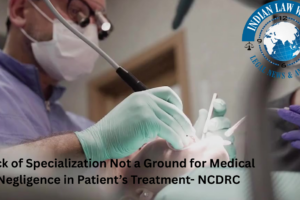 Amongst all segments of the legal field, criminal justice has always been proactive about embracing the latest technological innovations to protect citizens and improve the outcome of legal cases and rulings. Deception detection tests (DDT) such as polygraph, narco-analysis and brain-mapping are also a result of the ever growing technology. These tests, although considered useful to know the conceived truth, have various medical and legal implications. In this article, we discuss different types of DDT, their legal aspect, and evidentiary value of the results from these tests.
Amongst all segments of the legal field, criminal justice has always been proactive about embracing the latest technological innovations to protect citizens and improve the outcome of legal cases and rulings. Deception detection tests (DDT) such as polygraph, narco-analysis and brain-mapping are also a result of the ever growing technology. These tests, although considered useful to know the conceived truth, have various medical and legal implications. In this article, we discuss different types of DDT, their legal aspect, and evidentiary value of the results from these tests.
Different types of DDT
Narco-analysis: The term Narco-analysis is a combination of two words, with narcho having a Greek root meaning Anaesthesia. The term combinely means psychoanalysis. This is done using some drugs, usually Pentothal Sodium, to bring the accused to a state of hypothesis resembling sleep, that is to say, although the person is sub-consciously awake and cannot talk, they may answer direct questions. Further, since the accused has more or less lost the ability to create imaginary stories and lie, there is considered a high chance of them revealing the truth.
Polygraph: This test does not include infusion of any drug, but is rather based on our body’s reaction to certain questions. For this test, certain instruments like the cardiograph, pneumograph, cardio-cuffs, and electrodes are attached to the body of the subject to record their reaction in-terms of pulse rate, blood pressure, respiration rate, etc. This test is done in three phases: pre-test interview, chart recording and diagnosis. The examiner has a set of questions based on the case, some of these questions are used as baseline which are essentially the questions that the investigator knows the answers to. When any deviation from the baseline happens, it is considered a sign of a lie.
Brain-Mapping: This is somewhat similar to the lie detector test. It is also known as the Brain Electrical Activation Profile (BEAP) or P300 or Brain-wave fingerprinting. It is also conducted in three phases. Instead of asking questions from the subject, they are made to hear or see things attached to the case. The principle underlying this test is when exposed to the material probes, the subject will emit the P300 waves as a result of familiarity with those materials.
These tests have been criticized on both medical and legal grounds. Studies have shown that these tests can have significant effects on a subject’s body. For example, if used more than prescribed, a few drugs used during Narco-analysis can even lead to death of the accused. Further, many studies have also questioned the reliability of these tests.
 Involuntary administration of drugs in DDT and evaluation of intrusion of right to privacy: With respect ˘to legal grounds, a question that arises is whether these tests, if conducted, violate one’s right to privacy by intruding on their mind and body. The Supreme Court in Selvi v. State of Karnataka, AIR 2010 SC 340, the Court discussed the validity of these tests at length and laid down the principle for conducting the same. The legal questions in this judgement is the involuntary administration of certain scientific techniques, namely narco-analysis, polygraph and BEAP test for the purpose of improving investigation efforts in criminal cases.
Involuntary administration of drugs in DDT and evaluation of intrusion of right to privacy: With respect ˘to legal grounds, a question that arises is whether these tests, if conducted, violate one’s right to privacy by intruding on their mind and body. The Supreme Court in Selvi v. State of Karnataka, AIR 2010 SC 340, the Court discussed the validity of these tests at length and laid down the principle for conducting the same. The legal questions in this judgement is the involuntary administration of certain scientific techniques, namely narco-analysis, polygraph and BEAP test for the purpose of improving investigation efforts in criminal cases.
Selvi v. State of Karnataka Judgement of the Supreme Court
The 256 page judgment delivered by a three-judge bench including the then chief justice of India, K.G. Balakrishnan, Justices R.V Raveendran and Justice J.M Panchal was result of various special leave petitions which were combinely heard in the case of Smt. Selvi Murugeshan. The combined batch of petitions all include accused who were subjected to some sort of scientific tests without their consent. The issues that arose in this judgment:
- Whether the involuntary administration of the impugned techniques violates the ‘right against self-incrimination’ enumerated in Article 20(3) of the Constitution?
- Whether the investigative use of the impugned techniques creates a likelihood of incrimination for the subject?
- Whether the results derived from the impugned techniques amount to ‘testimonial compulsion’ thereby attracting the bar of Article 20(3)?
- Whether the involuntary administration of the impugned techniques is a reasonable restriction on ‘personal liberty’ as understood in the context of Article 21 of the Constitution?
A. Take aways of the Selvi Judgment
The Hon’ble Supreme Court in Selvi judgment held that no individual should be forcibly subjected to any of the techniques in question, whether in the context of investigation in criminal cases or otherwise. Doing so would amount to an unwarranted intrusion into personal liberty. Important takeaways are-
- Voluntary administration of the drug with safeguard: However, we do leave room for the voluntary administration of the impugned techniques in the context of criminal justice, provided that certain safeguards are in place.
- Voluntary administration does not give it evidentiary value: Even when the subject has given consent to undergo any of these tests, the test results by themselves cannot be admitted as evidence because the subject does not exercise conscious control over the responses during the administration of the test.
- Information discovered subsequently admissible under Section 27 of IEA: However, any information or material that is subsequently discovered with the help of voluntary administered test results can be admitted, in accordance with Section 27 of the Evidence Act, 1872.
- NHRC Guidelines: The National Human Rights Commission had published ‘Guidelines for the Administration of Polygraph Test (Lie Detector Test) on an Accused’ in 2000. These guidelines should be strictly adhered to and similar safeguards should be adopted for conducting the ‘Narcoanalysis technique’ and the ‘Brain Electrical Activation Profile’ test.
B. NHRC Guidelines for the Administration of Polygraph Test (Lie Detector Test) on an Accused’ in 2000
(i) Consent is important: No Lie Detector Tests should be administered except on the basis of consent of the accused. An option should be given to the accused whether he wishes to avail such test.
(ii) Access to lawyer provided and implications should be explained: If the accused volunteers for a Lie Detector Test, he should be given access to a lawyer and the physical, emotional and legal implication of such a test should be explained to him by the police and his lawyer.
(iii) Consent has to be recorded: The consent should be recorded before a Judicial Magistrate.
(iv) Due representation of lawyer: During the hearing before the Magistrate, the person alleged to have agreed should be duly represented by a lawyer.
(v) Status of recordings only as statement:At the hearing, the person in question should also be told in clear terms that the statement that is made shall not be a ‘confessional’ statement to the Magistrate but will have the status of a statement made to the police.
(vi) Factors to be considered: The Magistrate shall consider all factors relating to the detention including the length of detention and the nature of the interrogation.
(vii) Conditions of recording of lie detector test: The actual recording of the Lie Detector Test shall be done by an independent agency (such as a hospital) and conducted in the presence of a lawyer.
(viii) Factual narration: A full medical and factual narration of the manner of the information received must be taken on record.
C. Right against self-incrimination
The court held that involuntary administration of the impugned techniques violates the ‘right against self-incrimination’. While analysing the right against self-incrimination guaranteed under Article 20(3), the court observed that the compulsory administration of neuroscientific tests amounted to testimonial compulsion and hence violated Article 20(3) of the Constitution. The court reaffirmed the judgement delivered in M.P. Sharma vs. Satish Chandra ((1954] SCR 1077) where the court held that the right under Article 20(3) is not confined to the courtroom and protects not only accused but also witnesses and suspects. Further, the court elaborated upon the object of right against self-incrimination, which is to ensure that the testimony considered by the court was reliable. The court concluded that since there is a high chance of involuntary statements being inaccurate, it violates the purpose of the right.
D. Right to Privacy
With respect to the right of privacy and dignity, the court noted that involuntary administration of the impugned techniques violates the rights under Article 21 of the Constitution. The Court reaffirmed the relationship between right to privacy and right against self-incrimination. IT was held that although laws of evidence could be used for interference with physical privacy in certain circumstances, they could not form the basis for compelling a person to impart personal knowledge about a relevant fact”. The Court in this case concluded holding that these tests cannot be directed on the accused person without taking the assent from the accused person, obtained before a Judicial Magistrate in the presence of their lawyer.
International practice with regard to DDT
Narco-analysis has been used as an aid in presenting collaborative evidence, however, it raises a question as to whether these tests provide a testimonial compulsion in the judicial systems around the world. At present, Narco-analysis tests in India have some validity but are not completely admissible. The Courts in India consider the circumstances under which this evidence was obtained and accordingly, assess its admissibility.
USA
In the United States of America, various studies have been taken up by the American Medical Association and the American Psychiatric Association, subsequent to which narco-analysis has been considered unreliable. It is believed that under the influence of truth serums an individual may give misleading answers. Furthermore, it has also been considered that narco-analysis may potentially lead to violation of the Fifth Amendment.
UK
Narco-analysis test reports are not considered admissible in the United Kingdom. They are not considered reliable and hold almost no credibility in the English Courts.
Canada
On the contrary, there are no standards of admissibility of the scientific evidence in Canada. The Supreme Court of Canada has not fixed any permanent standard and is in favour of judging the admissibility depending on the merit of each individual case.
Evidentiary value of such evidence in India: The Indian Evidence Act, 1872 has no express provision for the admission of evidence procured through such tests, however, Indian Judiciary time and again has given both non supportive and positive views on this topic. Section 24 to 27 of the Act suggest that the statements through Narco-analysis would be barred from being admissible as evidence. Further, if there is any sign of coercion, intimidation, or any other kind of influence such tests would be rendered meaningless under Section 24(8) of the Act. The theory behind this is, the subject has merely any control over their conscious when they are under the influence of any Narcotic drug or their reactions being recorded by any instrument used to conduct such tests, and there’s an implied action of going against the will of the subject.
DDT recordings equivalent to a confession to a police officer: The tests have evidentiary value as much as of a statement by a semi-conscious person, and the tests are yet to receive complete permission from the law. The Court in Selvi v. State of Karnataka also held that if DDT is conducted on an accused, the statement made or the analysis drawn from that subject would have the status of a statement made to the police and not a confessional statement. Section 25 – confession to police officer not to be proved. No confession made to a police officer shall be proved as against a person accused of any offence, Section 25 expressly declares so. It would not would be voluntary. Such a confession will be irrelevant whatever may be its form, direct, express, implied or inferred from conduct.

















Add Comment